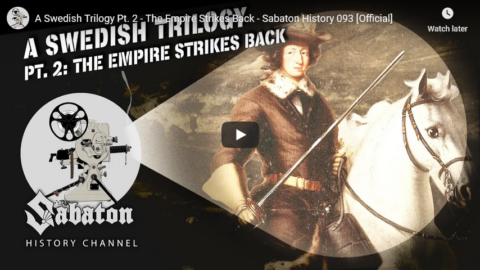Sabaton History
Published 12 Nov 2020The Swedish Empire was on the verge of collapse. After years of mismanagement and neglect, King Charles XI. could only stand and watch as a huge Danish army invaded the realm from the south. Fortress after fortress fell in front of the Danish advance into Scania. With his back to the wall, King Charles XI. had only one option left: To fight! The Swedish Empire rallied its remaining forces and prepared to strike back with the fury of desperation. With the future of Sweden on the line, the two armies met on the frozen battlefield of Lund.
Support Sabaton History on Patreon: https://www.patreon.com/sabatonhistory
Listen to Sabaton on Spotify: http://smarturl.it/SabatonSpotify
Official Sabaton Merchandise Shop: http://bit.ly/SabatonOfficialShopHosted by: Indy Neidell
Written by: Markus Linke and Indy Neidell
Directed by: Astrid Deinhard and Wieke Kapteijns
Produced by: Pär Sundström, Astrid Deinhard and Spartacus Olsson
Creative Producer: Maria Kyhle
Executive Producers: Pär Sundström, Joakim Brodén, Tomas Sunmo, Indy Neidell, Astrid Deinhard, and Spartacus Olsson
Community Manager: Maria Kyhle
Post-Production Director: Wieke Kapteijns
Editor: Karolina Dołęga
Sound Editor: Marek Kaminski
Archive: Reuters/Screenocean – https://www.screenocean.comSources:
Nationalmuseum
Finnish National Gallery
Icons from The Noun Project: Cannon by Graphic Nehar, Skull by Muhamad Ulum, prisoner by Luis Prado
Song:You Might Have Heard of Me – Arthur BensonMusic by: Sabaton
An OnLion Entertainment GmbH and Raging Beaver Publishing AB co-Production.
© Raging Beaver Publishing AB, 2019 – all rights reserved.
November 13, 2020
A Swedish Trilogy Pt. 2 – The Empire Strikes Back – Sabaton History 093 [Official]
Oddly, the Canadian media evince no interest whatsoever in the Trudeau government’s malign plans for the Internet
In The Line, Peter Menzies shows how little the mainstream media outlets in Canada care about the power grab the feds are attempting with their proposed “get money from web giants” shakedown:
In order to understand where media and public attention has been the past couple of weeks, all you had to do was listen in on Monday morning’s Ottawa news conference.
Six days after Heritage Minister Steven Guilbeault had introduced ground-breaking legislation to regulate content online, Prime Minister Justin Trudeau announced more cash to bring better Internet to rural and remote communities. There were also some COVID-19 updates and something about help for agriculture.
And, of course, the questions asked by the media were about the U.S. election. What else could possibly be of interest?
Eventually there were a few inquiries about Telesat and low-Earth-orbit satellites, but you get the point: things that matter to people’s daily lives such as cable bills, data plans, Netflix, cellular service, crappy WiFi and slow Internet connections haven’t been of much interest to Canadian media lately.
So there has been a dearth of chatter about Guilbeault’s controversial plan to (my words, not his): restrict consumer choice, tax Netflix to finance certified Canadian content (Cancon) and bring to an end the greatest period of prosperity in the history of the Canadian film and television industry. Did I mention stifling innovation, increasing streaming subscription costs and scaring away investment? No? My bad. Those too.
Guilbeault has decided that the agency dedicated to defining the nation’s TV and radio diet — the Canadian Radio-television and Telecommunications Commission (CRTC) — is now going to be in charge of what you are allowed to dine on online as well. No longer will you be able to manage your preferences. No more popcorn and candy for you. Going forward, Cancon spinach and broccoli will be on your plate every evening. Breathtakingly, Guilbeault has “modernized” communications legislation by giving authority over the Internet to something called a “radio-television” commission by using something still called the “broadcasting” act.
Lee-Speed Military Model Commercial Enfield
Forgotten Weapons
Published 27 Jan 2017In 1892, just a few years after the British military adopted the Lee-Metford rifle, the BSA and LSA factories began offering several configurations on the civilian/commercial market. They would produce them all the way into the 1930s, with your choice of Metford or Enfield rifling, and in Sporting, Trade, or Military/Target configurations. The Lee-Speed name comes from the patents used in the rifles — James Paris Lee for the magazine, and Joseph Speed for several improvements to the bolt and magazine. Speed was an employee of the Royal Small Arms Factory at Enfield, and was instrumental in the development and adoption of the Lee rifles.
This particular example is a Military/Target rifle, of the Lee-Enfield MkII pattern. Note the safety lever on the cocking piece, the Martini style rear sight, and the magazine chained to the trigger guard assembly. When they haven’t been sporterized, the Lee-Speed military pattern rifles are a great time capsule of British rifle design. Military rifles were generally updated as new patterns were adopted, while these civilian guns were not.
http://www.patreon.com/ForgottenWeapons
Cool Forgotten Weapons merch! http://shop.bbtv.com/collections/forg…
If you enjoy Forgotten Weapons, check out its sister channel, InRangeTV! http://www.youtube.com/InRangeTVShow
QotD: Military allies
Partnership implies the burden is shared more or less equally. If I bought twenty quid’s worth of shares in The Spectator and started swanning about bitching that Conrad Black didn’t treat me as a partner, he’d rightly think I’d gone nuts. The British in their time were at least as ruthless about such realities as the Americans are today. For example, in September 1944, in one of the lesser-known conferences to prepare for the post-war world, Churchill and Roosevelt met in Quebec City. They had no compunction about excluding from their deliberations the Canadian Prime Minister, Mackenzie King, even though he was the nominal host. There’s a cartoon of the time showing King peering through a keyhole as the top dogs settled the fate of the world without him.
And guess what? Militarily speaking, Canada was a far bigger player back then than Britain is today: the Royal Canadian Navy was the world’s third-biggest surface fleet, the Canucks got the worst beach at Normandy — but hey, why bore you with details? In those days that still wasn’t enough to get you a seat at the table.
Mark Steyn, “The Brutal Cuban Winter”, The Spectator, 2002-01-26.






